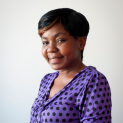The International Center for Journalists has named six journalists from around the world as winners of the 2016 Global Health Reporting Contest. They produced riveting stories, from profiles of pregnant women living in the heart of the Zika epidemic in Brazil to health workers traveling on bikes to distribute medicines in Cameroon.
The entries were selected from more than 150 submissions. The winners – from Brazil, Cameroon, China, India, Russia and Zimbabwe – will visit Washington, D.C., Atlanta and New York this fall as part of a 10-day study tour. They will meet global health experts and journalists who focus on medical issues. Each winner also receives a $1,000 cash prize. The contest is sponsored by Johnson & Johnson. In New York, they will be honored at an Awards Dinner featuring a panel discussion called, “Is It Too Late to Stop the Zika Pandemic?”
The winners:


Brazil
Mariana Barros, an investigative reporter for Recife-based TV Jornal, produced a three-part series named “Diary of an Epidemic.” She takes an intimate look at the lives of pregnant women as they face the uncertainty and challenges of the Zika epidemic. Barros focuses on families in Pernambuco, an impoverished region where a record number of children were born with microcephaly, but there are few medical facilities to help them.


Cameroon
Colette Patricia Ngo Ngouem’s “Trail of ‘Docta Basco,” published in the Yaounde-based daily Mutations, follows community health workers who travel on bicycles to remote villages where they provide preventive care. In “A Lifeline in the Far North,” she shows how motorcycle ambulances make it possible to quickly transfer emergency cases to health facilities in Cameroon’s far-northern region, saving lives.


China
Ding Zeng’s “Ark Children, Vaccines, Ethiopia and China,” published in the Hong Kong-based Phoenix Weekly, looks at an app that sends mobile alerts to health-care workers when energy blackouts cause vaccine-storage cooling units to fail. The story explains how this new technology can save lives in remote and poverty-stricken areas by letting vaccinators know when vaccines are no longer effective.


India
Rohan Singh investigated India’s efforts to improve health and living conditions for its swelling population. In “Ash Increasing Pollution and Health Hazards,” he looks at how Delhi’s poor are the biggest victims of pollution. In “Swachha Bharat Abhiyan: Reality Check,” Singh takes an in-depth look at an ambitious government program that has failed to deliver on a promise to provide sanitation and toilets to citizens across India.


Russia
Daria Sarkisyan’s “Eternal Question: What is the Most Effective Birth Control?”published in Afisha Daily, offers audiences a detailed perspective on modern contraception strategies. In a story for the online magazine Wonderzine, “To Vaccinate or Not: Why Are Vaccinations Needed, and When to Do Them,” she provides up-to-date information on recommended vaccinations, while addressing arguments from vaccination opponents.


Zimbabwe
Phyllis Mbanje’s story for Newsday, “Giving Birth in ‘Exile’ After Tokwe-Mukosi Disaster,” describes the challenges faced by pregnant women and children living in transit camps two years after flooding forced at least 20,000 people from their homes. In “To Legalise Abortion or Improve Access to Contraceptives,” she explores this controversial issue for Zimbabweans.